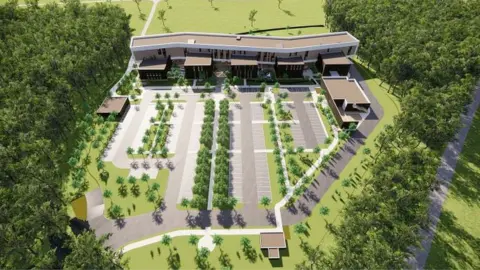NHS Stanford Hall £100m rehab facility 'will be revolutionary'
 National Rehabilitation Centre
National Rehabilitation CentreA £100m NHS rehabilitation facility, due to open in 2024, "will revolutionise" care, according to an academic who is working on the centre.
Prof Mark Lewis, an expert in musculoskeletal biology at Loughborough University, is advising on the National Rehabilitation Centre (NRC).
The NRC is due to open at Stanford Hall, on the Nottinghamshire-Leicestershire border in 2024.
Prof Lewis said it would help drive excellence in the field.
The NRC will be a 70-bed hub for treatment and research.
NHS officials have said it would be "game-changing" for those recovering from serious injury or illness.
 National Rehabilitation Centre
National Rehabilitation CentreIt will be built by Integrated Health Projects (IHP) beside the Defence Medical Rehabilitation Centre (DMRC), near Rempstone in Nottinghamshire.
Prof Lewis - who is the academic lead on the project for Loughborough - said it would "revolutionise rehabilitation" and bring together research, innovation, education, and training alongside clinical practice to drive excellence in this area.
"Rehabilitation is a fascinating area as it means something to everyone but never the same thing to everyone," he said on the university's Cuppa with a Scientist podcast.
"I see rehabilitation as having a major life event - whether this is a car accident or being diagnosed with Type 2 diabetes - and then going through a rehabilitation process after that.
"This centre will treat people and also bring together a community of researchers to create a world-leading centre of excellence.
"It's going to be transformational."
He added the NRC would focus on three types of rehabilitation - pre-rehabilitation, to prevent conditions occurring, acute rehabilitation, when something has just happened, and chronic - or long-term - rehabilitation - and look at the role technology can play in each.
"Wearable technology is obviously really important in this area, so if we can devise devices and apps that can help people do the right thing at the right time if anything does happen, that's great," Prof Lewis added.

Follow BBC East Midlands on Facebook, on Twitter, or on Instagram. Send your story ideas to [email protected].
